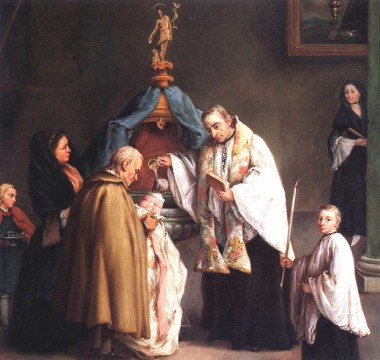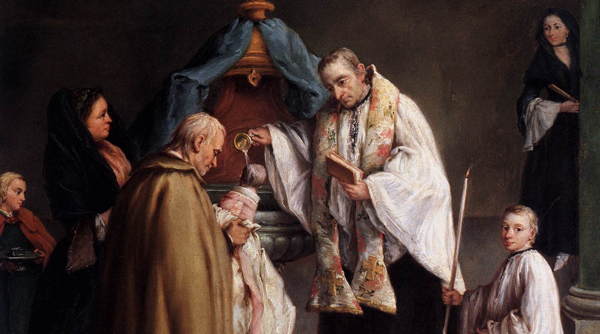What Exactly Are Virtues?
AS HUMAN BEINGS in the world of time and space, we have to interact constantly with three basic realities:
1) things that cause or promise to cause pleasure;
2) things that cause or threaten to cause pain or harm; and
3) other persons.
Our passions tend to react automatically to pleasures and pains…If we form the habit of making our decisions and taking action based only on those automatic, irrational reactions, we will form vices—habits or patterns of acting that contradict what is truly good for our human nature. If we form the habit of taking into account those important emotional reactions as we make our decisions but finally taking action based on the firmer principles of faith and reason, we will form virtues. Virtues can simply be described as our natural powers acting habitually and easily in a proper manner, acting in accordance with the truth of our human nature and vocation. The more virtuous we are, the more doing-the-right-thing and experiencing the internal benefits of doing-the-right-thing—regardless of how difficult or complex that may be—become second nature.
 The Cardinal Virtues
The Cardinal Virtues
Through the ages, philosophers have identified four basic virtues that are like the hinges of our moral and spiritual life. (The word cardinal actually comes from the Latin word that means “hinge.”) They correspond to those three realities that we interact with on a regular basis.
If we learn to govern our raw desire for pleasure in accordance with what is truly healthy and in harmony with God’s purpose for our lives, we develop the cardinal virtue of temperance. Temperance takes different forms in relation to the different types of pleasure that we have to deal with (chastity, sobriety, meekness, humility). If we learn to govern the fear that pain and suffering inspire, so that this never impedes us from doing what is right and necessary according to God’s purpose for our lives, we develop the cardinal virtue of  fortitude or courage, whose sister virtues include patience and perseverance. If we learn to treat all other persons (God as well as our fellow human beings) with the dignity that they deserve, regardless of how we may feel about them or what they may be able to do for or against us, then we grow in the virtue of justice, which also has a slew of sister virtues (e.g., honesty, piety, obedience).
fortitude or courage, whose sister virtues include patience and perseverance. If we learn to treat all other persons (God as well as our fellow human beings) with the dignity that they deserve, regardless of how we may feel about them or what they may be able to do for or against us, then we grow in the virtue of justice, which also has a slew of sister virtues (e.g., honesty, piety, obedience).
Those three cardinal virtues perfect the exercise of our will and emotions in relation to the types of realities that we have to interact with in this world. The fourth cardinal virtue, prudence or wisdom, is the development of our intelligence so that it recognizes and discerns what actions are proper (virtuous, healthy, in accordance with our true good) within the myriad and tangled situations of real life.
The Theological Virtues
 When we were baptized, we were adopted into God’s family, and he infused into our soul capacities to relate to him that did not belong to our pre-baptized nature. This infusion gave the life of grace to our souls. We were enabled to know God, to recognize his voice and his truth, and to accept and believe in him and in those truths that he reveals; this capacity is known as the theological virtue of faith. We were also given a deep impulse to expect our fulfillment in life from God himself, not from any of God’s creatures, as good and beautiful as they may be. This impulse is known as the virtue, the capacity, of theological hope. Finally, were we given the ability, the supernatural capacity, to actually enter into interpersonal communion with the Trinity, to live in friendship with God, as if we were his equals—which by nature we are not; only through grace have we been given this potential. This capacity to engage with the Trinity in a relationship of mutual self-giving is known as the theological virtue, the soul-power, of love, also called divine charity.
When we were baptized, we were adopted into God’s family, and he infused into our soul capacities to relate to him that did not belong to our pre-baptized nature. This infusion gave the life of grace to our souls. We were enabled to know God, to recognize his voice and his truth, and to accept and believe in him and in those truths that he reveals; this capacity is known as the theological virtue of faith. We were also given a deep impulse to expect our fulfillment in life from God himself, not from any of God’s creatures, as good and beautiful as they may be. This impulse is known as the virtue, the capacity, of theological hope. Finally, were we given the ability, the supernatural capacity, to actually enter into interpersonal communion with the Trinity, to live in friendship with God, as if we were his equals—which by nature we are not; only through grace have we been given this potential. This capacity to engage with the Trinity in a relationship of mutual self-giving is known as the theological virtue, the soul-power, of love, also called divine charity.
In a sense, through the infusion of grace at baptism, God “supernaturalized” our human nature. Now faith opens and directs our intellect toward the divine light of God himself, not just to the created lights of finite truths. Now hope spurs our hearts to yearn for completeness in God himself, not only in the good things God has created. Now theological love enables us to converse with and experience an intimate, familial relationship with the infinite God, not only with fellow human beings. It’s as if God altered our spiritual DNA on the day of our baptism, so that we are now truly members of God’s family, not only legally and emotionally, in a way that no merely human adoption can make an adopted child into a member of that adopting family.
New Strength for a New Standard
This may seem abstract and impractical, but it’s critical for a clear understanding of what growing in virtue really means for a Christian. Merely natural virtues, which have as their standard and measuring rod human nature unaided by grace, are no longer sufficient for the spiritual maturity we are called to. God’s supernatural grace is indeed infused into our human nature, and it works from within that nature. And so the four cardinal virtues that describe the maturation of our natural powers are still valid for the Christian. But they are elevated to a new standard.
For example, self-preservation of the individual and the tribe was the highest value for the pagan world. This led them to see other tribes as inherently less worthy than themselves, as not deserving of the rights (justice) that members of their own tribe enjoyed. In the light of faith, however, and as members of God’s family, we now know that every human person has an equal dignity based on having been created in God’s image, and so all human persons have equal rights. We no longer reserve our compassion and kindness just for members of our own tribe.
To take another example, we can reflect on how our supernatural faith and hope in God enables Christians to put earthly comfort and success in second place, behind their top priority of friendship with Jesus Christ. This is how so many Christian martyrs have found the strength to refuse to renounce that friendship even in the face of seductive blandishments and agonizing tortures. Only because of this supernatural DNA, this infused grace of God at work within us, does anything in the gospel make sense to us and attract us. Only faith, hope, and love, for example, could motivate a Christian to renounce the goods of this world completely and follow a vocation to the monastery or the cloister: “What profit is there for one to gain the whole world and forfeit his life?” (Mark 8:36).
Editor’s Note: This is another excerpt from Father John Bartunek’s new book “Seeking First the Kingdom” filled with “practical examples and down-to-earth wisdom which will show you how to bring Christ into each facet of your life”. Click here to learn more about the book…or if you wish to get it for a friend or relative who doesn’t read on line.
+
Art: Hinge, Nino Barbieri, own work, February 2008, CCA-SA 2.5 Generic; Balanced scale of justice, Perhelion, 15 July 2011, CC0 1.0 Universal Public Domain; The Baptism, Pietro Longhi, 1755, PD-US author’s life plus 100 years or less; all Wikimedia Commons.


